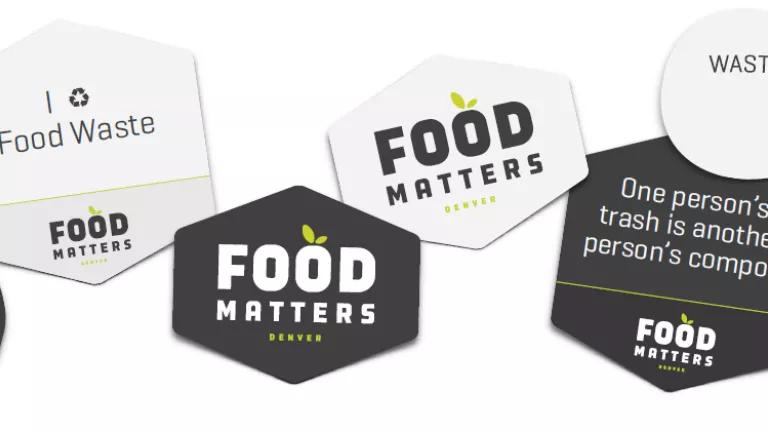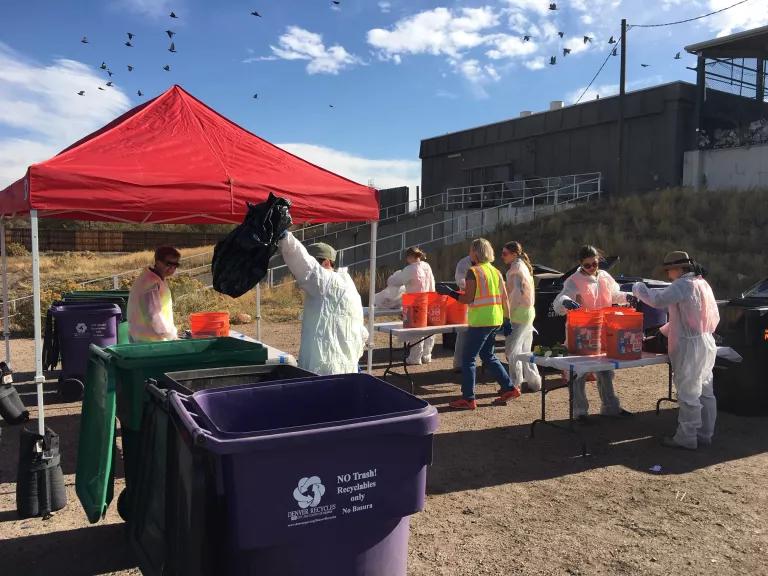Denver Restaurants Agree: Wasting Food Is Nuts!

Co-authored by Susan Renaud, Community Engagement Administrator, Denver Department of Public Health and Environment
“Squash food waste,” is one of the punny slogans you might see on a restaurant’s window if you take a walk down Denver’s South Pearl neighborhood. As part of NRDC’s Food Matters project, Denver is teaming up with local restaurants to fight food waste.
Denver is one of two pilot cities partnering with NRDC on the Food Matters project to implement and share innovative solutions and strategies for food waste reduction from preventing food waste before it happens, to rescuing surplus food to help feed people, to composting food scraps. In Denver, about 25% of total food waste in the City is estimated to come from the restaurant sector.
By engaging directly with chefs and restaurants to reduce food waste, the City can build a stronger food economy by helping restaurants to save money, build their own sustainability brand and educate their customers about their impact in reducing food waste. Simultaneously, the city is able to work towards achieving their goal to build a healthy, vibrant, inclusive and resilient food system while ensuring that good food ends up on people’s plates rather than landfills.
Denver's Food Matters Restaurant Challenge
Denver’s Food Matters Restaurant Challenge started with a pilot program in Denver’s Highlands neighborhood. For two months (May-June 2019), the City of Denver’s business sustainability program, Certifiably Green Denver (CGD), rolled out a pilot project to help restaurants in the Highlands neighborhood reduce their food waste.
To develop the pilot, the team spent almost a year meeting with key stakeholders in the community, from chefs to neighborhood groups to landlords, to identify barriers and to determine how to most effectively help restaurants reduce food waste without overburdening daily operations and staff. The resulting pilot format asked each participating restaurant to adopt a food waste strategy, get set up with food donation pickup service and utilize a free compost service including interior compost bins, bags, signage and staff training for the duration of the pilot.
Eight restaurants participated in the pilot, including fine dining, fast casual, coffee shop, bakery and full service restaurants. To collect quantitative and qualitative data on the pilot, CGD performed pre- and post-pilot meetings with the group of restaurants, pre- and post-pilot waste audits and exit interviews. The findings were informative; highlights included:
Prevention
The restaurants found it difficult to come up with a food waste prevention strategy and most told us that they hadn’t created one. However, during the exit interviews, we found that almost all of the restaurants did indeed employ prevention strategies without realizing it. Many of the restaurants ended up with prevention solutions as a result of seeing what food was being wasted via composting. Some of the strategies included making stocks out of veggie and herb scraps to use in risotto; making dog treats out of leftover bacon, cheese and oats; changing ordering strategies; and running specials. Creation of new recipes and running specials helped one restaurant save between $300-$400 per month.
Donation
Food donation was a challenge for the restaurants and not widely used. Because many of the restaurants cook to order, they did not have much food waste left over to donate. Other restaurants did not have the space to refrigerate and store food for it to be rescued.
Compost
Offering free compost service was the main hook to get restaurants to participate in the pilot. They had all previously been interested in composting but hadn’t begun due to barriers including time, perceived cost and lack of training. By providing the service, infrastructure and training free of charge, they were willing to start and the behavior change stuck with staff. Five of the eight participating restaurants continued composting after the pilot at their own expense.
Community
The restaurants shared that they found the pilot to be beneficial in developing a community among the restaurants in the neighborhood. They did not know one another in advance and enjoyed developing a camaraderie with one another through the project.
Diversion
Though the waste audits did not provide perfect data, they indicated that on average the restaurants began the pilot with a diversion from landfill rate of approximately 15-20%. By the end, they were diverting approximately 70% of their waste. Audits showed that they have a potential diversion rate of approximately 85-90% with additional staff training.

The South Pearl Street pilot, underway this fall, includes ten participating restaurants and two additional restaurants serving as sustainability mentors for the participating restaurants. Denver hopes to continue to roll out more neighborhood restaurant challenges through 2020.
Restaurant food waste challenges, like the program created in Denver, are a fun and effective strategy to engage the business sector in food waste reduction. To learn more about how you can create a restaurant challenge in your community, check back for the NRDC Food Matters Restaurant Challenge Guide for step-by-step directions, important considerations, stakeholders to engage, and materials that can be adapted for your community.
Co-authored by Susan Renaud, Community Engagement Administrator, Denver Department of Public Health and Environment



